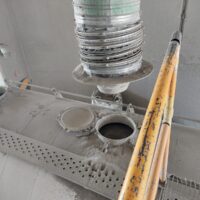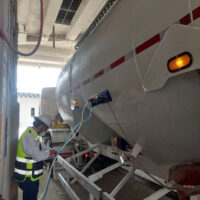PROBLEM: Reducing CO2 Emissions Causes Fluffier Cement
A leading global cement manufacturer has been implementing innovative, environmentally-conscious manufacturing processes to reduce their CO2 emissions. These advancements have led to the production of finer, less dense cement, which has resulted in transportation challenges.
SITUATION: Inefficiencies of Transporting CO2–Enhanced Cement
The logistics team at this large cement manufacturing plant recognized that there are issues caused by this finer and more aerated cement, making it difficult to settle properly in dry bulk trailers. The recent changes have led to:
- Under-filled trailers – increasing the number of shipments
- Material hang-ups – slowing unloading and requiring manual intervention
- Higher fuel costs and emissions – due to inefficient transport and counter to the overall sustainability goals
While the MARTIN® MT-FAST™ Dry Bulk Trailer Vibrators were purpose-built for quicker and more complete unloading of pneumatic trailers, they hypothesized that the same vibrators could be utilized during the loading process to eliminate trapped air and maximize trailer capacity.
SOLUTION: 5.5% Increase in Capacity and 43% Decrease in Loading Time
By using the MT-FAST™ on the trailers when loading the cement, the manufacturer was able to fully and evenly compact the product. This resulted in a 5.5% increase in capacity per load, which resulted in numerous benefits:
- Fully-loaded trailers
- Faster loading and unloading
- Reduced fuel consumption
- Lower transportation expenses
- Reduced carbon emissions
An added bonus of this groundbreaking use of the MT-FAST™ was that loading time to fill the trucks was reduced by 43%!
| Total Load Time (Minutes) | Final Net Weight (KG) | |
|---|---|---|
| Without MT-FAST™ | 35 | 34,000 |
| With MT-FAST™ | 20 | 35,870 |
| Difference | 42.86%- | 5.5%+ |
The success of this initiative demonstrates the potential for MARTIN®’s existing technologies to be repurposed in novel ways to address emerging challenges in the evolving landscape of sustainable manufacturing.


